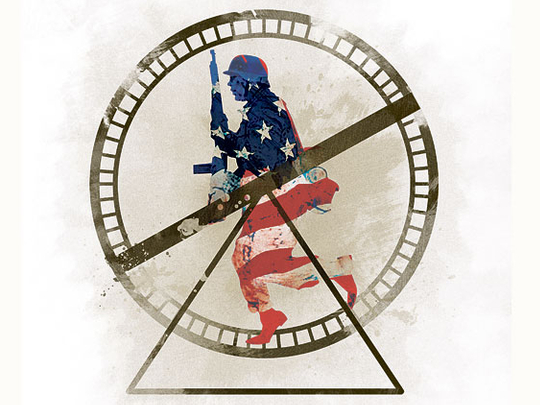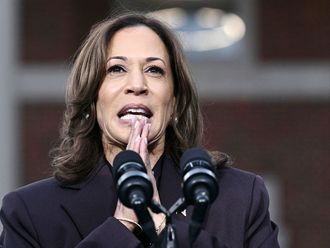
If loose lips sink ships, then in running off at the mouth General Stanley A. McChrystal has sent his own to the bottom of the ocean. McChrystal, formerly commander of Nato forces fighting that grim war in Afghanistan — a war about to enter its tenth year, which for Americans is the longest in their history — was dismissed recently by President Barack Obama. He was fired after his cocky remarks about the president, the vice-president and the American ambassador in Kabul, Karl Eikenberry, with whom he had been bickering for months over strategy, appeared in Rolling Stone.
General David H. Petraeus, the man behind the ‘surge', and the ‘Sunni awakening movement' that derailed the momentum of the insurgency in Iraq, was tapped by the president to take the reins as the new military chief in Afghanistan.
But in the end, it's not really about one general being given the boot by his commander in chief. In the past, generals were fired by presidents with impressive ease and with minimum disruption to the system, from Zachary Taylor to George Patton to Douglas MacArthur. Rather it is about the cloud of uncertainty and the sense of drift in that intractable land, whose culture Americans know less about than the enigmatic cultures of Vietnam and Iraq, with which they made fateful contact. It is, moreover, about the incoherence of the purported goals the US claims to be pursuing there, goals that appear vague not only to the American public but to top military commanders as well.
Lingering questions
The old question asked by intellectuals and activists four decades ago — why are we in Vietnam? — immortalised in Norman Mailer's book with the same title, may very well be asked about Afghanistan by these same intellectuals' and activists' children today. Why is the US in Afghanistan? Are its goals there nation-building? Conducting a counterinsurgency? Busting Al Qaida and denying it a haven? Establishing a central government and a competent bureaucracy in Kabul backed by a well-trained army and national police? Another question: Is July 2011, the date by which Obama promised to start withdrawing American troopps, an improbable deadline for such a draconian task?
Consider in this regard what a senior adviser to McChrystal was quoted as saying recently: "I think we know that we don't know, though it's not for lack of trying". About as blunt as you can be.
By now, perhaps the question Americans need to ask, after nine years of conflict, and more than 1,000 dead and 6,000 injured, is not why they are in Afghanistan, but why the US continues to wage an unwinnable war and to pursue unrealistic goals, at a time when many of its allies are heading for the door.
Sure the Taliban are a relentless enemy that have shown they are capable of matching the US surge for surge. The major assault launched last week, for example, in the remote mountainous high ground in Komar, along Afghanistan's border with Pakistan, aimed at destroying a growing insurgent haven there, involved 700 US and Afghan troops pitted against as many as 250 rebel fighters. "The Taliban know we are bringing our surge of forces," Major General John Campbell, the senior commander in eastern Afghanistan, was reported as saying. "They realise that they can't let that happen, so they are pursuing their own surge."
Let's resort to metaphor here: When you're desperate for victory — victory that continues to elude and frustrate you, year in, year out — your desperation exudes an odour, as it were, that determined insurgents can "smell". But a more determined enemy, not dependent on his olfactory faculties, confronts Americans in Afghanistan today and is derailing their efforts to transform the country into a viable nation. That enemy is embodied in the political culture, or the culture of corruption, which permeates every subsystem of the social system. It involves rampant graft by government officials, bureaucrats, representatives of the ruling class and other elite Afghans. They have for years openly and brazenly been moving vast sums of money to overseas accounts, and building garish villas in the Sharpur district, Kabul's Beverly Hills. All of this has been made possible by the enormous influx of US dollars, donor money and, yes, the opium trade, thus aggravating the class stratification in a country ranked among the poorest in the world.
Greed and graft
The long and short of it is that you can't build a viable nation when rulers are more preoccupied with lining their pockets than with ruling. This is as true of Afghanistan today as it has been of all those failed states around the world that we have come to call, in deference to political correctness, "developing" countries.
All of which is good news for the Taliban.
For Americans in Afghanistan, fighting corruption is a lost cause, a task more daunting, though clearly less bloody, than fighting insurgents. Corruption, long encoded in the country's political culture, will one day be writ large as the major factor that impeded, indeed blocked, and finally defeated, the American enterprise of nation-building and counter-insurgency efforts in Afghanistan.
Fawaz Turki is a journalist, lecturer and author based in Washington. He is the author of The Disinherited: Journal of a Palestinian Exile.









